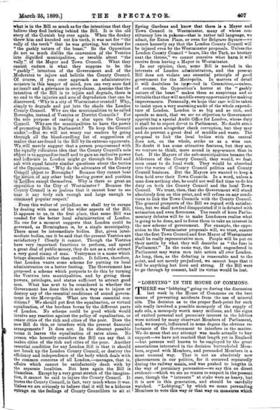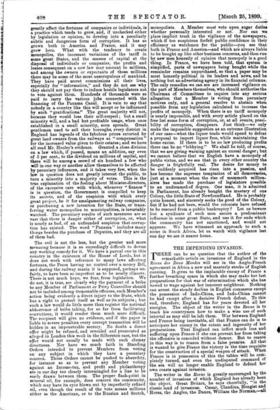"LOBBYING" IN THE HOUSE OF COMMONS. T HERE was "lobbying" going
on during the discussion last week in the House of Commons on the best means of preventing accidents from the use of mineral oils. The decision as to the proper flash-point for such oils really involved a possible monopoly of the supply of safe oils, a monopoly worth many millions, and the signs of excited personal and pecuniary interest in the lobbies were noticed by many observant Members of Parliament, and, we suspect, influenced. in some degree the obvious re- luctance of the Government to interfere in the matter. We do mean that any attempt was made actually to buy support—we have not reached that length yet in England —but persons well known to be employed by the great associations interested in the decision buttonholed Mem- bers, argued with Members, and persuaded Members in a most unusual way. That is not an absolutely new phenomenon in our politics, for it occurred repeatedly during the railway mania, and was pushed to lengths in the way of pecuniary persuasion—we say this on direct evidence—which we see no reason to suspect in the present case, though the " interests " at slake were as heavy, but it is new in this generation, and should be carefully watched. "Lobbying," by which we mean persuading Members to vote this way or that way on measures which greatly affect the fortunes of companies or individuals, is a, practice which tends to grow, and, if unchecked either by legislation or opinion, to develop into a peculiarly subtle and dangerous form of corruption. It has so grown both in America and France, and it may grow here. What with the tendency to create monopolies, the incessant variations of the tariff in some great States, and the masses of capital at the disposal of individuals or companies, the profits and losses consequent on a new law may amount to millions, and among the owners or expectants of those millions there may be some of the most unscrupulous of mankind. They have paid secret commissions all their lives, especially for " information," and they do not see why they should not pay them to induce hostile legislators not to vote against them. Hundreds of thousands were so paid to carry the various jobs connected with the financing of the Panama Canal. It is vain to say that nobody in a country like this will accept or be influenced by such " gratifications." The great majority will not, because they would lose their self-respect; but a small minority will, and a bad but profitable usage, when once established in a small minority, soon spreads. Great gentlemen used to sell their boroughs, every district in England has legends of the fabulous prices extorted by great land owners from the railways as "compensation" for the increased value given to their estates ; and we have all read Mr. Hooley's evidence. Granted a close division on a law which, if passed, means an addition, say even of 5 per cent., to the dividend on millions of capital, and there will be among a crowd of six hundred a few who will in one way or another allow themselves to be affected by pecuniary influences, and it takes very few, when the law in question does not greatly interest the public, to turn a minority into a majority of votes. This is the true explanation of the feeling about Minister-directors, of the excessive care with which, whenever " finance " is in question, the Government is compelled to keep its secrets, and of the suspicion with which every great project, be it for amalgamating railway companies, or purchasing a new invention for the State, or trans- ferring water monopolies to municipalities, is invariably watched. The pecuniary results of such measures are so vast that there is danger either of corruption, or, what is nearly as bad, of an unfounded suspicion that corrup- tion has existed. The word " Panama" includes many things besides the purchase of Deputies, and they are all of them bad.
The evil is not the less, but the greater and more menacing because it is so exceedingly difficult to devise any working remedy for it. We have a partial one in this country in the existence of the House of Lords, but it does not work with reference to many laws affecting fortunes, the Peers having no control over a money Bill, and during the railway mania it is supposed, perhaps un- fairly, to have been so imperfect as to be nearly illusory. There is not much hope, we fear, from legislation. We do not, it is true, see clearly why the payment of a bribe to any Member of Parliament or Privy Councillor should not be included among treasonable offences, such Member's action being evidently a direct injury to the State, which has a right to protect itself as well as its subjects ; but such a law would do little more than register the national abhorrence of bribe taking, for so far from facilitating convictions, it would render them much more difficult. The recipient will give no evidence, and if the payer is liable to severe penalties every corrupt transaction will be bidden in an impenetrable secrecy. No doubt a direct offer might be refused, and revealed and prosecuted as alleged in London this week in the Silberston case, but the offer would not usually be made with such clumsy directness. Nor have we much faith in Standing Orders intended to prevent Members from voting on any subject in which they have a pecuniary concern. Those Orders cannot be pushed to absurdity, for instance so as to prevent any Member voting against an Income-tax, and profit and philanthropy are in our day too closely intermingled for a line to be easily drawn between them. The proper flash-point in mineral oil, for example, does concern the community, which may have its eyes blown out by imperfectly refined oil, even though the result of the vote means millions either m the American, or to the Russian and Scotch, monopolists. A Member must vote upon sugar duties whether personally interested or not. Nor can we place implicit trust in the vigilance of the newspapers, which if too suspicious forfeit public confidence in their efficiency as watchmen for the public—you see that both in France and America—and which are always liable to be bought up like other business concerns, and then run by new men honestly of opinion that monopoly is a good thing. In France, we have been told, that system is simplified, parts of newspapers being bought while the remainder remains unpurchased, so that a paper may be most honestly political in its leaders and news, and be nothing but an advertising agency in its financial columns. The only remedies we can see are increased vigilance on the part of Members themselves, who should authorise the Chairman of Committees to inquire into any serious allegation that a Member is voting from pecuniary motives only, and a general resolve to abstain when possible from any legislation calculated to increase the profits of monopoly. When there is no tariff monopoly is nearly impossible, and with every article placed on the free list some form of corruption, or, at all events, possi- bility of corruption, disappears. Just think—we only make the impossible suggestion as an extreme illustration of our case—what the liquor trade would spend to defeat a proposal to import liquor free, while maintaining the home excise. If there is to be no law producing profits there can be no "lobbying." We shall be told, of course, that we are giving warning against an unreal danger; but we cannot believe that we English have a monopoly of public virtue, and we see that in every other country the danger is frightfully real. The desire for money to be suddenly acquired has risen into a passion, and has become the supreme temptation of all democracies, just at a moment when the rise of mammoth million- aires has made the purchase of legislators possible to an undreamed-of degree. One man, it is admitted in Parliament, has already bought the mastery of one Colony, the little State of Newfoundland. He is probably quite honest, and sincerely seeks the good of the Colony, but if he had not been, would the colonists have refused to be rescued from a public bankruptcy ? Let us beware lest a syndicate of such men secure a predominant influence in some great State, and use it for ends which the community has not sanctioned, and would not approve. We have witnessed an approach to such a scene in South Africa, let us watch with vigilance lest one day we see it nearer home.







































 Previous page
Previous page